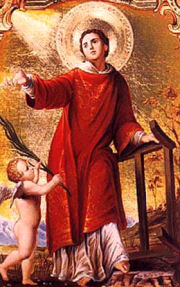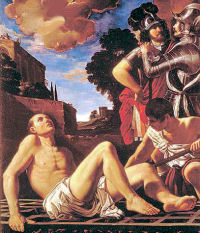Posted on 08/10/2002 6:35:46 PM PDT by Lady In Blue

![]()
Never quite understanding the significance of this prayer, the Irish priest thought it odd, until later as a seminarian he studied the life of St. Lawrence.
BUMP
BUMP
**According to tradition, for his presumed impudence, Lawrence was then slowly roasted on a grill on the site of the Basilica di San Lorenzo in Rome, in the hope that he would publicly renounce his religion and reveal the names of the wealthy Christians. He is often represented holding a gridiron to memorialize this grisly manner of martyrdom.**
This is difficult, no more than difficult, to imagine.
BTTT on the Feast of St. Lawrence, August 10, 2005!
|
Prayer to St. Laurence, Deacon and Martyr
|
St. Laurence, pray for us, that the flames of divine love may burn away all traces of vice within us, and that we may be practical and zealous in the service of the poor. Amen.

|
August 10, 2005
St. Lawrence
(d. 258?)
The esteem in which the Church holds Lawrence is seen in the fact that today’s celebration ranks as a feast. We know very little about his life. He is one of those whose martyrdom made a deep and lasting impression on the early Church. Celebration of his feast day spread rapidly. He was a Roman deacon under Pope St. Sixtus II. Four days after this pope was put to death, Lawrence and four clerics suffered martyrdom, probably during the persecution of the Emperor Valerian. A well-known legend has persisted from earliest times. As deacon in Rome, Lawrence was charged with the responsibility for the material goods of the Church, and the distribution of alms to the poor. When Lawrence knew he would be arrested like the pope, he sought out the poor, widows and orphans of Rome and gave them all the money he had on hand, selling even the sacred vessels to increase the sum. When the prefect of Rome heard of this, he imagined that the Christians must have considerable treasure. He sent for Lawrence and said, “You Christians say we are cruel to you, but that is not what I have in mind. I am told that your priests offer in gold, that the sacred blood is received in silver cups, that you have golden candlesticks at your evening services. Now, your doctrine says you must render to Caesar what is his. Bring these treasures—the emperor needs them to maintain his forces. God does not cause money to be counted: He brought none of it into the world with him—only words. Give me the money, therefore, and be rich in words.” Lawrence replied that the Church was indeed rich. “I will show you a valuable part. But give me time to set everything in order and make an inventory.” After three days he gathered a great number of blind, lame, maimed, leprous, orphaned and widowed persons and put them in rows. When the prefect arrived, Lawrence simply said, “These are the treasure of the Church.” The prefect was so angry he told Lawrence that he would indeed have his wish to die—but it would be by inches. He had a great gridiron prepared, with coals beneath it, and had Lawrence’s body placed on it. After the martyr had suffered the pain for a long time, the legend concludes, he made his famous cheerful remark, “It is well done. Turn it over and eat it!” The church built over Lawrence’s tomb became one of the seven principal churches in Rome and a favorite place for Roman pilgrimages.
|
||||
BTTT on the Feast of St. Lawrence, August 10, 2006!
BTTT on the Feast of St. Lawrence, August 10, 2007!
 This young deacon and heroic martyr is numbered among those saints who were most highly venerated by the ancient Roman Church. Next to the feast of Sts. Peter and Paul, that of St. Lawrence ranked highest in the Roman sanctoral cycle. "From the rising of the sun unto its setting," says St. Leo, "whenever the glory of Levites beams forth in splendor, Rome is deemed no less illustrious because of Lawrence than Jerusalem because of Stephen."
This young deacon and heroic martyr is numbered among those saints who were most highly venerated by the ancient Roman Church. Next to the feast of Sts. Peter and Paul, that of St. Lawrence ranked highest in the Roman sanctoral cycle. "From the rising of the sun unto its setting," says St. Leo, "whenever the glory of Levites beams forth in splendor, Rome is deemed no less illustrious because of Lawrence than Jerusalem because of Stephen." Even though we have no genuine account of St. Lawrence's martyrdom, we do possess considerable evidence from most ancient times regarding the particulars of his passion. Legendary Acts tell how Lawrence was a disciple of Pope Sixtus II (257-258), who dearly loved him because of his special talents, but principally because of his innocence; in spite of his youth, the Pope numbered him among the seven deacons of Rome and raised him to the position of archdeacon. As such, Lawrence had the immediate care of the altar and was at the side of the saintly Pope whenever he offered the holy Sacrifice; to him also was confided the administration of the goods of the Church and the responsibility of caring for the poor.
During the persecution of Emperor Valerian (253-260), Sixtus II and his four deacons were martyred. Very ardently Lawrence desired to die with his spiritual father and therefore said to him: "Father, where are you going without your son? Where are you hastening, O priest, without your deacon? Never before did you offer the holy Sacrifice without assistants. In what way have I displeased you? In what way have you found me unfaithful in my office? Oh, try me again and prove to yourself whether you have chosen an unworthy minister for the service of the Church. So far you have been trusting me with distributing the Blood of the Lord."
This loving complaint of joyous self-oblation Sixtus answered with words of prophecy: "I am not forsaking you, my son; a severer trial is awaiting you for your faith in Christ. The Lord is considerate toward me because I am a weak old man. But for you a most glorious triumph is in store. Cease to weep, for already after three days you will follow me". After these comforting words he admonished him to distribute all the remaining Church goods allocated to the poor. While Lawrence was dispersing these items in the house of a certain Narcissus, a blind man named Crescentius asked for healing help by the imposition of hands. The holy deacon made the Sign of the Cross over him and the man began to see.
From his relations with Pope Sixtus, it was known that he acted as the steward over the Church's property. He was arrested therefore and placed under the watch of a certain Hippolytus. There in prison Lawrence cured the blind Lucillus and several other blind persons; impressed thereby, Hippolytus embraced the faith and died a martyr. Ordered by the authorities to surrender the treasures of the Church, Lawrence asked for two days time during which to gather them. The request was granted and he brought together in the house of Hippolytus the poor and the sick whom he had supported. These he led to the judge. "Here are the treasures of the Church!"
 Lawrence was tortured, scourged, and scorched with glowing plates. In the midst of excruciating pain he prayed: "Lord Jesus Christ, God from God, have mercy on Your servant!" And he besought the grace of faith for the bystanders. At a certain point the soldier Romanus exclaimed: "I see before you an incomparably beautiful youth. Hasten and baptize me." He had observed how an angel dried the wounds of Lawrence with a linen cloth during his passion.
Lawrence was tortured, scourged, and scorched with glowing plates. In the midst of excruciating pain he prayed: "Lord Jesus Christ, God from God, have mercy on Your servant!" And he besought the grace of faith for the bystanders. At a certain point the soldier Romanus exclaimed: "I see before you an incomparably beautiful youth. Hasten and baptize me." He had observed how an angel dried the wounds of Lawrence with a linen cloth during his passion.
Again during the night he was dragged before the judge and threatened with immediate death. But he replied: "My God I honor and Him alone I serve. Therefore I do not fear your torments; this night shall become as brightest day and as light without any darkness." When placed upon the glowing gridiron, he jested with his executioners and the cruel tyrant. "Now you may turn me over, my body is roasted enough on this side." Shortly after this had been done, he cried again: "At last I am finished; you may now take from me and eat." Then turning to God in prayer: "I thank You, O Lord, that I am permitted to enter Your portals." To comfort him during his torments God said to him: "My servant, do not be afraid. I am with you." He was put to death upon the Viminal Hill and buried on the Tiburtinian Way.
Such the passion and death of this Christian hero, a story that in the Roman Breviary is told by the antiphons and responsories. Already in Constantine's time there was erected over his grave a church that belonged to the seven major basilicas of Rome, St. Lawrence Outside the Walls.
Excerpted from The Church's Year of Grace, Pius Parsch.
Disclaimer: Opinions posted on Free Republic are those of the individual posters and do not necessarily represent the opinion of Free Republic or its management. All materials posted herein are protected by copyright law and the exemption for fair use of copyrighted works.